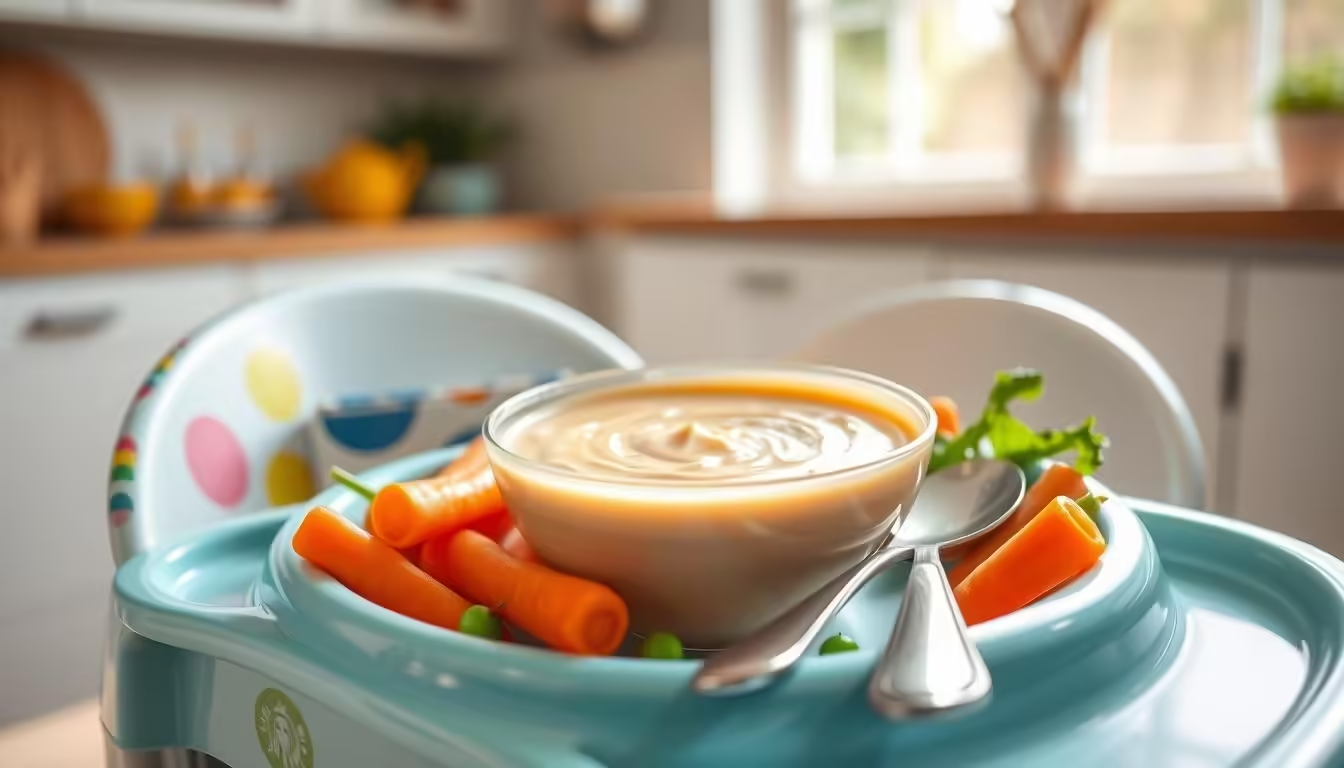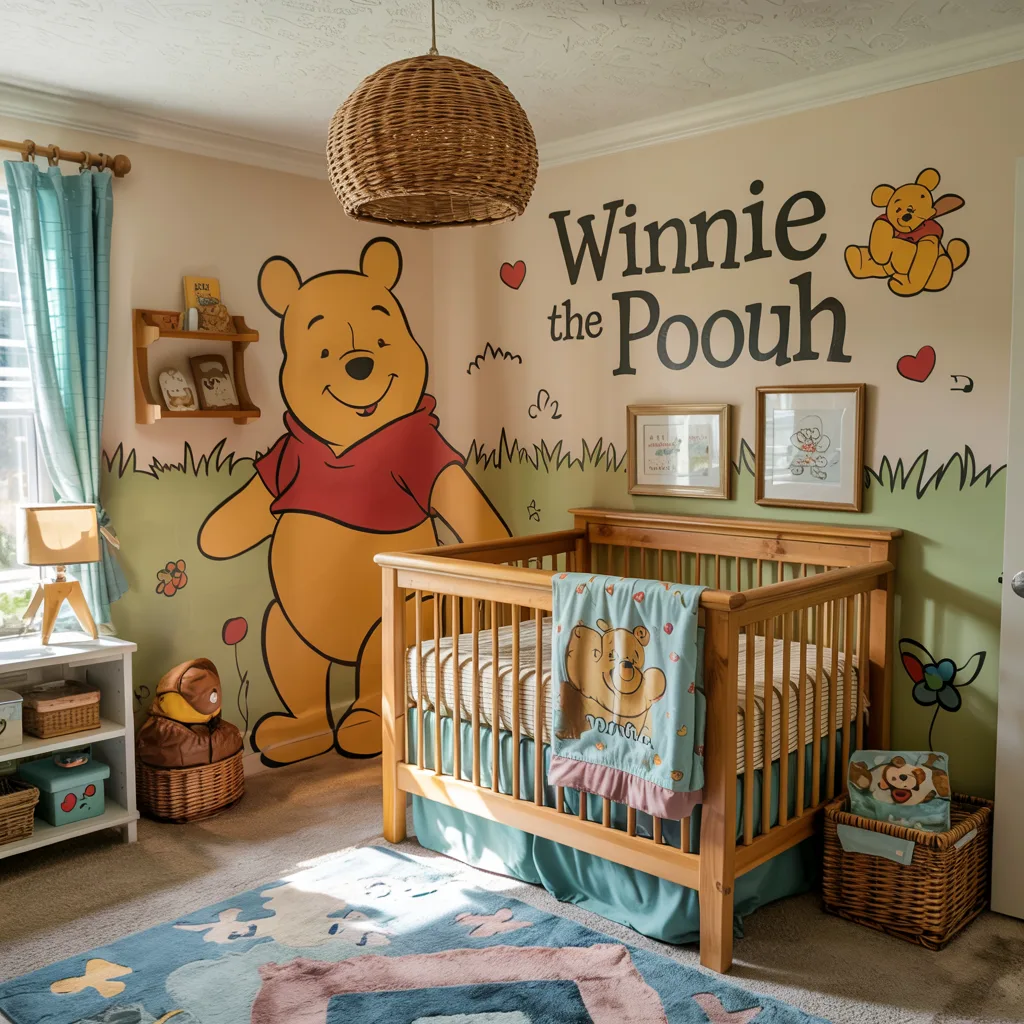Chicken is a fantastic first food for babies. It’s full of vitamins, fat, and protein that help them grow. But, making pureed chicken for your baby might seem scary. This article will show you healthy chicken baby food options. You’ll learn about homemade recipes, organic baby puree, and safe ways to add poultry to your baby’s diet.
Key Takeaways
- Chicken is packed with essential nutrients like protein, iron, and vitamin B12 that support a baby’s growth and development.
- Homemade chicken baby food can be easily prepared using simple ingredients and saved for later use.
- Organic baby food blends offer a convenient option for parents seeking high-quality, nutritious meals for their little ones.
- Introducing chicken as a first food for infants can be a great way to diversify their diet and expose them to new flavors.
- With proper preparation and storage methods, chicken baby food can be a wholesome and versatile part of your child’s nutrition.
Table of Contents
Introduction to Chicken Baby Food
Why Chicken is a Great First Food for Babies
Chicken is a top pick for introducing solid foods to babies. It’s lean and packed with nutrients, perfect for supporting your baby’s growth.
Chicken is full of high-quality protein, which is key for building and fixing tissues. It also has important vitamins and minerals like selenium and B vitamins. These help keep your baby healthy.
Chicken is easy for babies to digest, making it a smooth start to solid foods. As your baby’s digestive system gets stronger, chicken helps them move from milk to a variety of foods.
“Introducing chicken early on can help expand your child’s palate and encourage a lifelong love of nutritious, flavorful foods.”
Adding chicken to your baby’s diet means you’re giving them a protein-rich, nutrient-packed food. It also opens the door to a wide range of healthy foods. You can try different textures and flavors with chicken, making mealtime fun.
Chicken is a fantastic first food for babies, offering lots of nutrients and supporting their growth. By including chicken in your baby’s meals, you’re teaching them to love healthy eating for life.
Homemade Chicken Baby Puree Recipe
Introducing your little one to homemade chicken baby food is easy. This simple recipe is packed with protein and flavor. It’s a great way to feed your baby a nutritious meal.
The secret to this easy chicken puree is poaching the chicken. This keeps it moist and tender. Adding lemon and thyme gives it tasty flavors your baby will enjoy.
- Gather your ingredients: 2 boneless, skinless chicken thighs (or breasts), 4-6 tablespoons of liquid (water, broth, or milk), and optional seasonings like lemon slices, thyme, or bay leaves.
- Place the chicken in a saucepan and cover with the liquid of your choice. Bring to a gentle simmer and poach the chicken for 15-20 minutes, or until the internal temperature reaches 165°F (74°C).
- Remove the chicken from the poaching liquid and allow it to cool slightly. Once cooled, transfer the chicken to a blender or food processor.
- Blend the chicken, gradually adding the poaching liquid, until you achieve a smooth, creamy baby food recipe consistency.
- Taste the puree and adjust the consistency by adding more liquid if needed. You can also experiment with different herbs and spices to create unique flavor profiles.
| Nutrition Facts | Per Serving |
|---|---|
| Calories | 255 |
| Carbohydrates | 20g |
| Protein | 15g |
| Fat | 13g |
This homemade chicken baby food recipe is a great choice for your baby. It’s full of nutrients and tastes good. Try mixing it with your baby’s favorite veggies for a tasty meal.
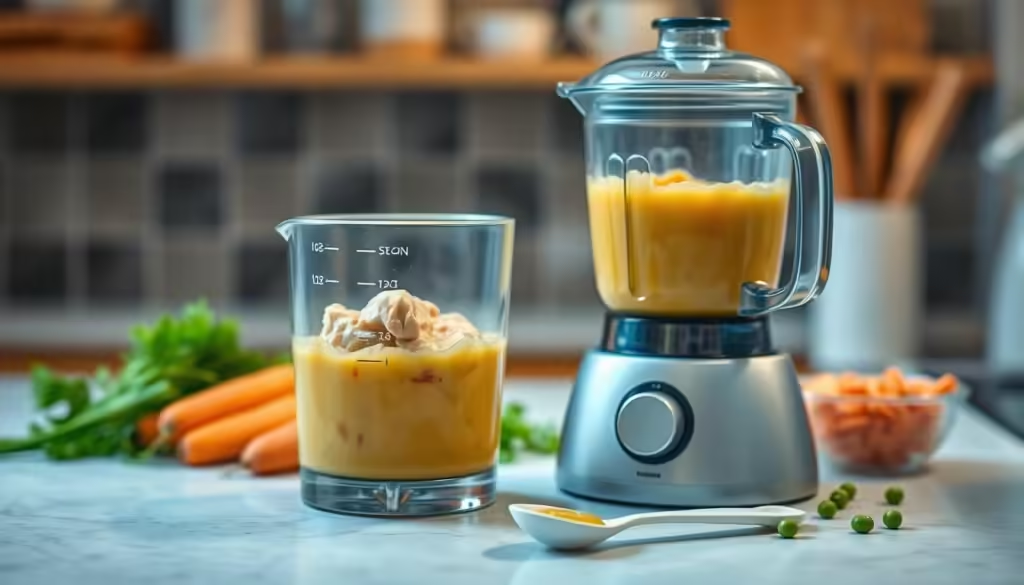
“Homemade chicken baby food is rich in protein and high in iron, making it beneficial for infants.”
Chicken Baby Food: Nutrient-Dense and Versatile
Chicken is a great choice for your baby’s first foods. It’s full of nutrients that help your baby grow strong. It also has vitamins and minerals that are important for your baby’s development.
One serving of homemade chicken baby food has 128 kcal. It has about 4g of carbs, 10g of protein, and 8g of fat. Chicken is rich in iron for red blood cells, vitamin B12 and choline for brain health, and vitamin A for eyes and immune system.
| Nutrient | Amount per 100g |
|---|---|
| Protein | 31g |
| Fat | 3.6g |
| Energy | 165 kcal |
| Iron | 1mg |
| Sodium | 74mg |
| Phosphorus | 228mg |
| Potassium | 256mg |
| Zinc | 1mg |
| Selenium | 27.6mcg |
| Vitamin A | 21 IU |
| Vitamin B1 | 0.1mg |
| Vitamin B2 | 0.1mg |
| Vitamin B3 | 13.7mg |
| Vitamin B6 | 0.6mg |
Chicken is easy to mix with other foods for your baby. You can blend it with sweet potato, carrot, or peas. Or make tasty chicken and veggie mixes. This makes chicken a great choice for a balanced diet for your baby.
“Chicken is a fantastic first food for babies, as it’s packed with essential nutrients and can be easily combined with other healthy ingredients to create delicious and nourishing meals.”
– Amy Palanjian, Author
Storing and Freezing Chicken Baby Food
When making homemade chicken baby food, it’s key to store and freeze it right. This keeps the food’s nutrients and texture good. Chicken baby food stays fresh in the fridge for 3 days or frozen for 2 months.
Safe Storage and Thawing Methods
To freeze chicken baby food, fill airtight containers or freezer-safe trays with it. Make sure to label each one with the date. To serve, thaw it in the fridge overnight or heat it gently in 20-second bursts. Be careful not to overcook the chicken.
It’s important to store and thaw chicken baby food correctly. Don’t refreeze thawed food as it can lose quality and safety. Instead, keep any leftover thawed puree in the fridge for up to 48 hours before eating.
| Storage Method | Recommended Storage Time |
|---|---|
| Refrigerator | Up to 3 days |
| Freezer | Up to 2 months |
By sticking to these tips, your homemade chicken baby food will stay nutritious and tasty. It’s a great, healthy choice for your baby.
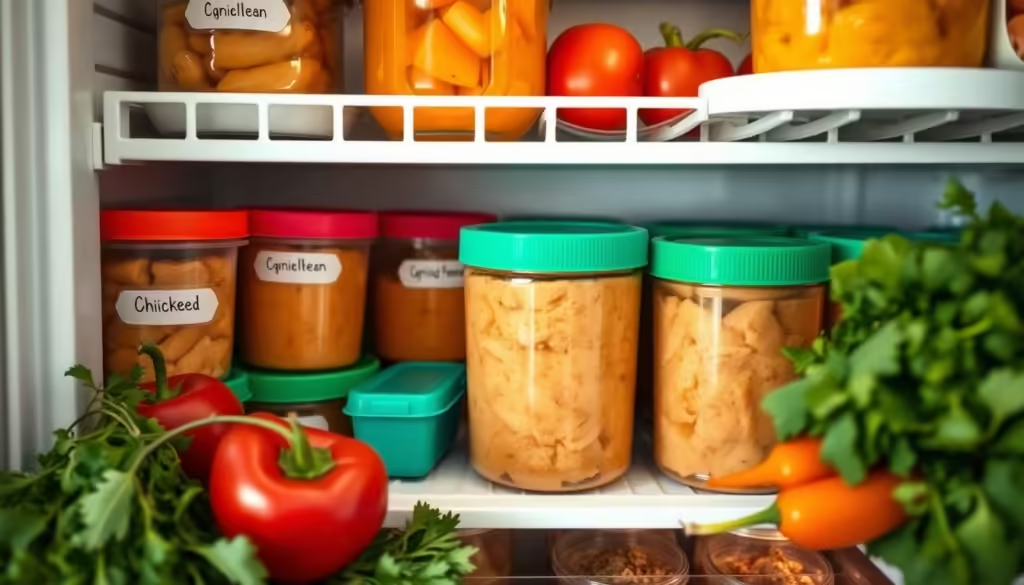
“Proper storage and thawing methods are essential to preserving the nutrition and texture of the chicken baby food.”
Introducing Chicken Baby Food to Your Little One
When your baby starts eating solid foods, chicken is a great choice. It’s usually introduced between 4-6 months. Your baby should be able to hold their head up, have doubled in weight, and show interest in food.
Before starting solids, talk to your pediatrician. They’ll check if your baby is ready. Start with small amounts and watch for any signs of an allergy.
- Chicken is full of nutrients like protein, fat, and vitamins B3, B6, and B12. It’s good for your baby’s growth.
- Even though chicken is rare, some people might be allergic to it, especially if they’re allergic to fish.
- Make sure chicken is the right texture for your baby. Start with smooth purées and then move to soft pieces.
Chicken adds important nutrients to your baby’s diet. It also introduces new tastes and textures. This helps your baby develop a healthy eating habit.
| Age | Chicken Preparation |
|---|---|
| 6-9 months | Smooth chicken purée or finely shredded chicken |
| 9-12 months | Soft, bite-sized pieces of chicken |
| 12+ months | Chicken nuggets (with caution for choking risk) |
Every baby is different. The right time and way to introduce chicken may vary. Listen to your baby and work with your pediatrician for a safe and healthy start.
Flavorful Chicken Baby Food Combinations
Starting your baby on chicken baby food is exciting. Mixing chicken puree with other healthy foods creates tasty blends. These mixes offer a variety of flavors, from sweet to savory, for your baby to enjoy.
Chicken and sweet potato is a great mix. The sweet potato’s natural sweetness goes well with the chicken’s savory taste. Another good choice is chicken and apple. The crisp apple adds a sweet touch to the chicken’s richness.
Chicken and spinach is a nutritious blend. Spinach adds color and iron, while chicken provides protein. Pears also pair well with chicken, offering a sweet and smooth taste.
| Chicken Baby Food Blend | Potential Benefits |
|---|---|
| Chicken and Sweet Potato | Offers a balance of savory and sweet flavors, while providing essential nutrients like vitamin A and vitamin C. |
| Chicken and Apple | Introduces a refreshing, fruity note to the chicken, while also supplying fiber and vitamin C. |
| Chicken and Spinach | Combines the protein-rich chicken with the iron-packed spinach for a nutrient-dense meal. |
| Chicken and Pear | Blends the savory chicken with the smooth, sweet pear, creating a delightful texture and flavor profile. |
Start with small amounts when introducing new flavors. Offering different chicken baby food blends helps your baby develop a varied taste. This way, they’ll enjoy a wide range of healthy, tasty foods for life.
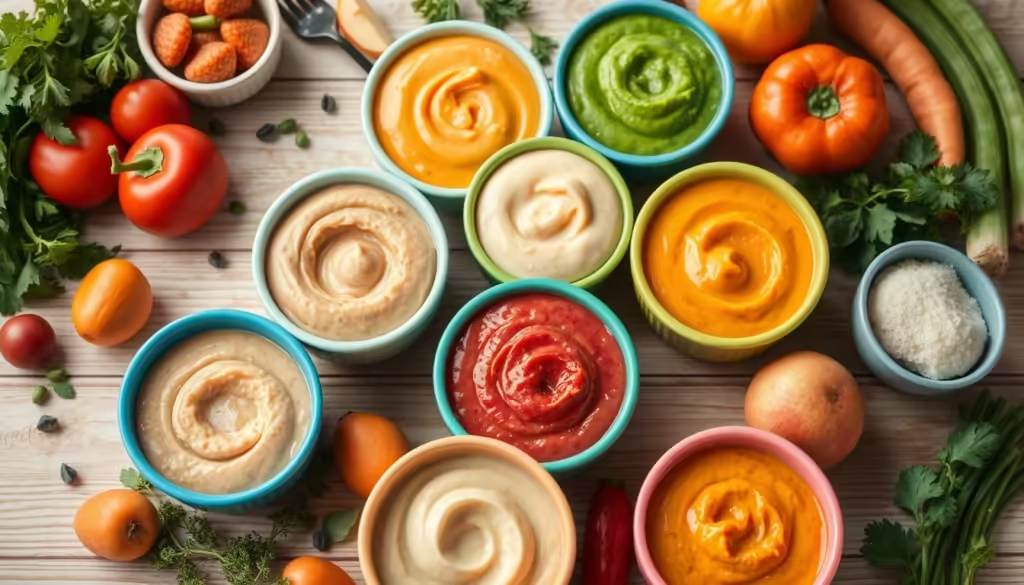
Chicken Baby Food: A Versatile Meal for the Whole Family
Chicken baby food isn’t just for babies. It’s a tasty, healthy meal for everyone. The homemade chicken puree recipe you use for your baby can be made for older kids and adults too.
Adapting the Recipe for Older Children and Adults
To make the chicken baby food recipe better for your family, you can change the seasonings and texture. Add more herbs, spices, or cheese to make it taste great for everyone. This way, you can keep it mild for your baby while making it flavorful for others.
This chicken baby food recipe is very versatile. You can make one dish that everyone can enjoy. Here are some ways to adapt the recipe:
- Add more herbs and spices, like garlic, rosemary, or paprika, for adults.
- Include diced veggies like bell peppers, onions, or zucchini for a hearty stew or casserole.
- Make chicken nuggets or patties for a fun, finger-food option for kids.
- Put the chicken on rice or noodles for a full, family meal.
By starting with the basic chicken baby food recipe and making it your own, you can make sure everyone loves the meal. This way, you can have a delicious, chicken-based meal for everyone.
| Ingredient | Quantity | Usage |
|---|---|---|
| Ground Chicken | 1 lb | For the base of the dish |
| Onion | 1 medium | Adds flavor and aroma |
| Zucchini | 1 cup, grated | Adds moisture and nutrients |
| Carrots | 1 cup, grated | Adds color and sweetness |
| Bell Peppers | 1 cup, diced | Adds texture and flavor |
| Seasonings | To taste | Customize to suit your family’s preferences |
By changing the chicken baby food recipe, you can make a family-friendly meal. This meal will please everyone’s taste buds and make sure your little one gets the nutrition they need.
Addressing Common Concerns
When you start adding chicken and spices to your baby’s food, you might worry. But, chicken can be a safe and healthy choice for your baby.
Chicken is not usually a common allergen for babies. But, it’s always good to watch for signs of an allergy. Look out for hives, rash, or tummy troubles.
Mild spices can help your baby get used to new tastes. This can make them more open to trying different foods. Just remember to use spices carefully and avoid too much.
Some parents worry about arsenic in rice-based foods. But, you can lower the risk by rinsing rice well before cooking. Also, try different grains and keep portions small.
With careful steps, you can safely add chicken and other healthy foods to your baby’s diet. This way, you can make sure your child is safe and well-fed.
| Safety Tip | Recommendation |
|---|---|
| Internal temperature of baby food | Reach 165°F to kill bacteria |
| Shelf life of homemade vs. store-bought baby food | Homemade lasts shorter (24-48 hours) compared to store-bought (up to 48 hours for fruits/veggies, 24 hours for meats) |
| Freezing baby food | Can be frozen for up to 3 months in freezer-proof containers or ice cube trays |
Keeping your child’s food safe is very important. By knowing how to handle and store food, you can safely introduce chicken and other good foods to your baby.
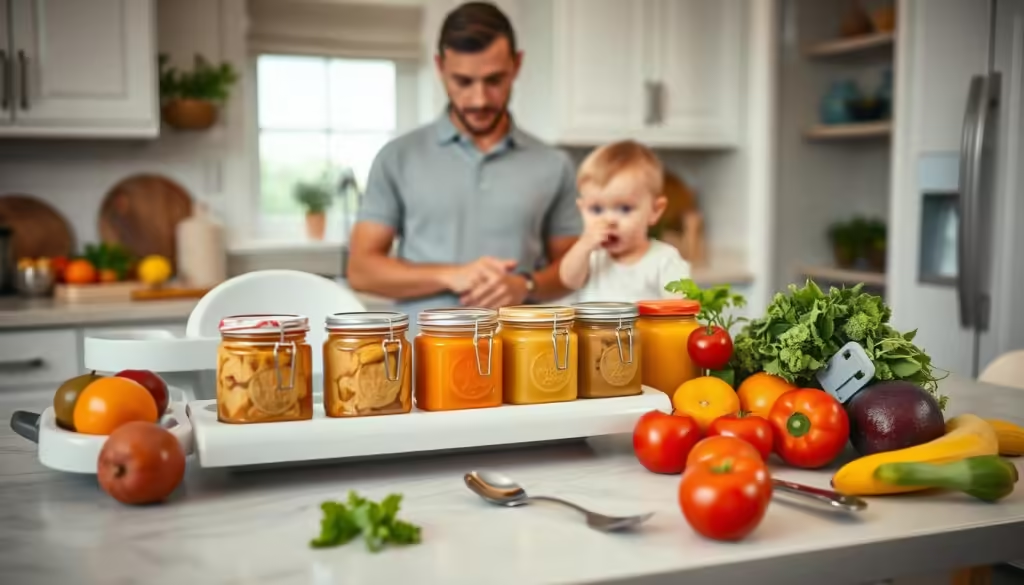
Baby-Led Weaning with Chicken
Serving Chicken in Finger Food Form
Chicken is a great choice for baby-led weaning. Your baby can feed themselves by picking up and eating larger pieces of food. Make sure the chicken is soft and easy for your baby to hold.
For baby-led weaning, bake, steam, or poach chicken until it’s tender. Then, cut it into small strips or cubes. This size is perfect for your baby’s little hands.
- Chicken is full of protein, iron, zinc, and vitamins that help your baby grow.
- Try different chicken options like shredded chicken or meatballs. This introduces new tastes and textures.
- Let your baby use their fingers to pick up the chicken. This helps them learn to feed themselves.
Always watch your baby when they’re eating. Change the chicken size and texture as needed. Chicken is a tasty and healthy part of baby-led weaning.
Conclusion
Chicken is a great first food for babies, packed with nutrients for growth. You can serve it as a smooth puree or in finger food form. It’s a versatile, nutritious, and tasty addition to your baby’s diet.
Chicken is full of protein, vitamins, and minerals. It helps with muscle growth and keeps the immune system healthy. Adding chicken to your baby’s meals introduces new flavors and supports their health.
Chicken is easy to prepare in many ways and can be enjoyed by everyone. You can puree it or serve it as finger food. As your baby grows, you can change chicken recipes to fit their tastes and needs.
FAQ
Is chicken a good first food for babies?
Yes, chicken is a great first food for babies. It’s packed with vitamins, fat, and protein. These are key for your baby’s growth.
How can I make homemade chicken baby food?
Try our Basic Chicken Baby Puree recipe for a simple, healthy meal. It’s perfect for babies 6 months and older.
What are the nutritional benefits of chicken for babies?
Chicken is full of vitamins, minerals, and healthy fats. It’s a top source of protein, iron, vitamin B12, and choline. These nutrients help your baby grow and develop.
How should I store and thaw chicken baby food?
Store chicken baby food in the fridge for up to 3 days or freeze for 2 months. To thaw, refrigerate overnight or reheat in 20-second intervals. Be careful not to overcook.
When can I introduce chicken to my baby?
Introduce chicken as a first food between 4-6 months. Make sure your baby has reached developmental milestones. Always check with your pediatrician before starting solids.
Can I mix chicken puree with other foods?
Yes, mix chicken puree with fruit or vegetable purees. This introduces new flavors and textures. Try it with sweet potatoes, apples, pears, or spinach.
Can the whole family enjoy the chicken baby food recipe?
Absolutely! Adjust the seasonings and texture for older kids and adults. It becomes a meal everyone can enjoy.
Are there any safety concerns with introducing chicken to my baby?
Start with small portions and watch for allergic reactions. Chicken is generally safe. Mild spices can also help your child’s taste buds.
Can I introduce chicken through baby-led weaning?
Yes, introduce chicken through baby-led weaning. Serve soft, easy-to-grasp chicken pieces. This helps your baby practice self-feeding while enjoying chicken’s nutritional benefits.

